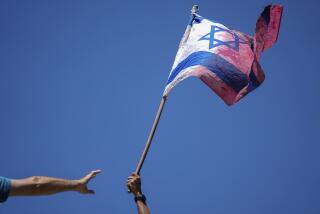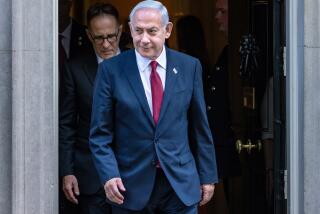Opposition leader Mohamed ElBaradei returns to Egypt
Reporting from Cairo â Opposition leader Mohamed ElBaradei, the Nobel Peace Prize laureate who formerly headed the U.N. nuclear regulatory agency, has returned to Egypt in a move expected to increase political pressure on President Hosni Mubarak as a new wave of nationwide protests are called for Friday.
ElBaradeiâs presence has energized activists who for months had urged him to take his National Front for Change to the streets. His arrival coincides with a decision by the Muslim Brotherhood, the countryâs largest opposition group, to encourage its young members to join the protests. The Islamist organization hasnât officially endorsed the demonstrations amid fear that its leaders could be imprisoned in a crackdown.
The 68-year-old ElBaradei, a lawyer, has been reluctant to join street protests in the past but indicated he would attend the rallies Friday. Itâs uncertain whether he has the tenacity and charisma to lead a mass movement or whether he would become another frustrated figure in a disparate opposition aiming to end the autocratic three-decade-long rule of Mubarak, a key U.S. ally.
The Obama administration has publicly urged Mubarak to allow protests to continue, although it is deeply concerned about potential upheaval that could result.
âI will participate,â ElBaradei said Thursday after leaving his residence in Vienna, where he had headed the U.N. agency, to fly to Egypt. âI wish we did not have to go out on the streets to press the regime to act.â
The addition of ElBaradei and the Brotherhood are major provocations to the regime, pitting an internationally respected negotiator and the Middle Eastâs largest Islamist group against an authoritarian government long criticized for political repression and brutality.
Mubarakâs ruling National Democratic Party has been stunned by the breadth and anger of protests that erupted Tuesday, inspired by this monthâs successful uprising in Tunisia.
âI believe ElBaradeiâs return will increase the already existing political momentum and the protest movement,â said George Ishak, a longtime opposition leader. âMany Egyptians are looking for someone to lead their efforts and theyâve seen this leader in ElBaradei.â
At this point, one of the major forces behind the demonstrations has been the April 6 youth movement, consisting largely of educated middle-class students and workers. The group, using Facebook and other Internet social networks, is urging Egyptians to follow the examples of unrest sweeping the region, including new outbreaks in Yemen and Jordan.
Organizers said the protests would begin after Friday prayers with demonstrators marching from mosques around Cairo and converging on Tahrir Square, near the parliament. The question is how many people will venture out to confront the police blanketing the city. In previous years, protests quickly faded in a mix of complacency and fear.
ElBaradei and the Brotherhood have faced other problems in their fight against one of the most entrenched police states in the region. Mubarakâs government was concerned a year ago when ElBaradei started his National Front campaign for constitutional reforms. But months later, when ElBaradei did not summon the masses to rallies, party officials decided he was too timid, and the opposition too divided, to threaten their hold on power.
The Brotherhood has been struggling with internal rifts as some members want the organization to remain a political force and others argue that it should center its mission on grass-roots social and religious programs. These pressures, along with the arrest of hundreds of its members, many of them top leaders, have weakened the group in recent years.
âThe Brotherhood has the numbers to take the masses to the streets and topple the regime,â said Abdelhalim Kandil, leader of the Kifaya, or Enough, opposition movement. âTheyâre still not yet ready for that radical step to take on the regime. Theyâre prisoners of history. They think, âWhat if we try to get rid of Mubarak and fail? Can we survive another crackdown?ââ
The weakness became apparent in November when the Brotherhood, which controlled 20% of parliament seats, was trounced in elections widely regarded as rigged by the ruling party. The defeat was another move by the government to isolate the organization from political life.
The Brotherhood, which renounced violence decades ago, has been targeted by security forces and been cast by successive Egyptian governments as an extremist threat determined to spread Islamic Sharia law across the region. It has conservative leaders but the group, whose members include hundreds of thousands of professionals, is more moderate than many Islamist organizations, despite its belief that only a Muslim should be elected president of Egypt.
ElBaradeiâs National Front and the Brotherhood complained before Tuesdayâs protests â which spread across the country and brought 10,000 people to Tahrir Square â that their members had been intimidated by security forces. The Interior Ministry in recent days has blamed the Brotherhood for the violence and vandalism seen during the protests.
Protests Wednesday and Thursday were violent, but much smaller and more scattered as security forces tightened their grip on the country. Some activists worried the protests were losing momentum.
But uncertainty caused a slide in the stock market Thursday. According to the Egyptian exchangeâs official website, the market dropped 6.2% after only 15 minutes of trading, prompting a 45-minute suspension. It was the first trading suspension since 2006.
If such problems persist, they could jeopardize Egyptâs economic growth and further exacerbate unemployment and inflation. Egyptâs deadliest protest in decades was in 1977 when bread subsidies were temporarily cut.
âThe situation is a direct result of the ongoing protests, as retailers panic and start reacting to political unrest,â Wael Ziada, head of research at EFG-Hermes for investment banking and securities brokerage, said in an interview. âThese types of events spread in the market like a contagion, and the situation is most likely to stay the same as long as the situation remains influx.â
The White House is quietly pressing Mubarak to lay out a specific plan to open up his government through political competition and credible elections, while warning against a crackdown on the opposition, said an administration official who spoke on condition of anonymity.
The Obama administration has a list of other measures for Egypt, including a lifting of its longstanding âemergency law,â which sharply limits political freedoms, the official said. The U.S. has pushed for an expansion of the influence given to civil society groups, and has condemned the irregularities in Egyptâs last elections.
Washington also has been promoting the use of social networks by civil activists and this week warned the government against obstructing them.
The United States is a huge supporter of Egypt, giving it $1.3 billion in military aid each year.
Times staff writers Paul Richter and Peter Nicholas in Washington and Amro Hassan in The Timesâ Cairo Bureau contributed to this report.
More to Read
Sign up for Essential California
The most important California stories and recommendations in your inbox every morning.
You may occasionally receive promotional content from the Los Angeles Times.











